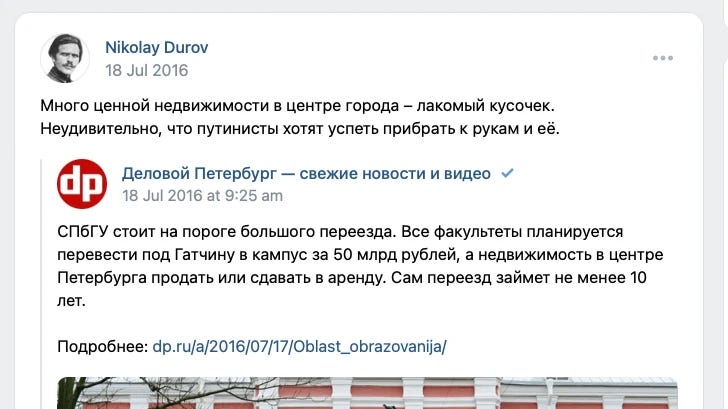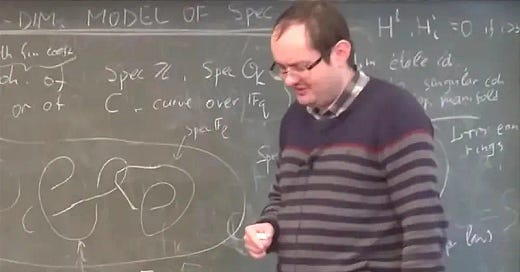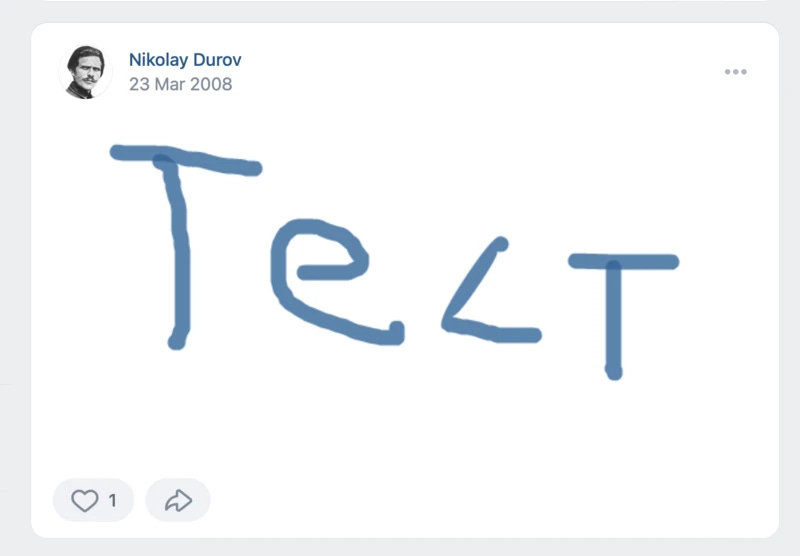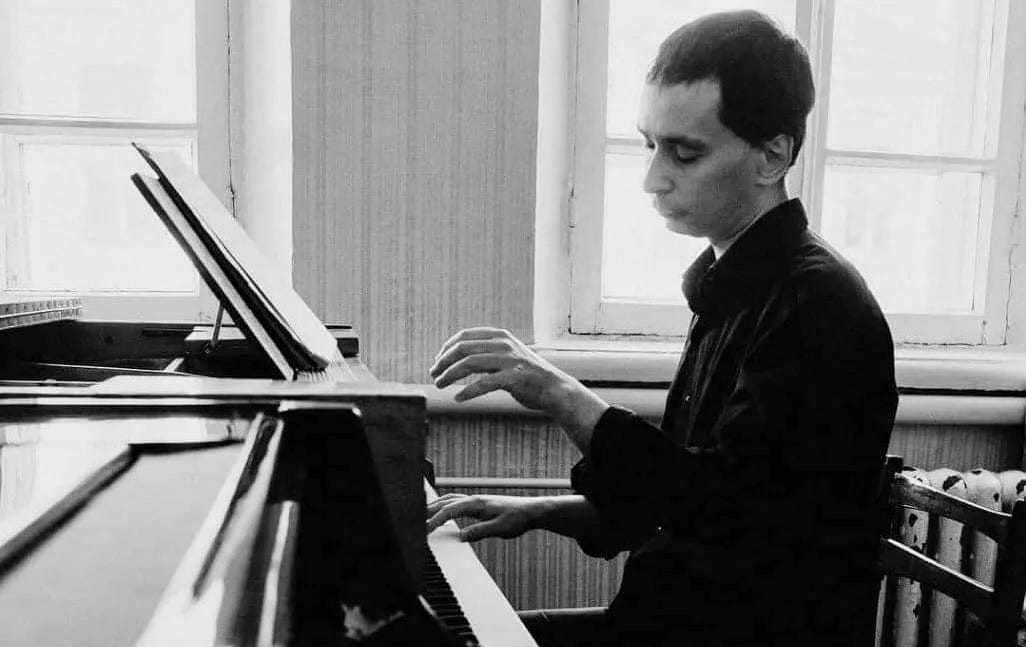‘A true genius.’ The maths prodigy sidekick (and brother) of Pavel Durov
What we know of Nikolai Durov, and his work with the recently-arrested ‘Telegram’ founder.
By Grigor Atanesian.
Pavel Durov was a well-known and controversial public figure long before his arrest in Paris late last month. Accused by French prosecutors of operating a service that has allowed trade in drugs and child pornography, among other crimes, Durov is seen as a standard bearer for free speech by some, and as a deeply dubious figure by others.
Far less is known about his older brother Nikolai, who helped Durov design the online platforms he fronted and became famous for. A key role in launching the ‘VKontakte’ social network and creating the Telegram messenger was played by Nikolai, who also conceptualised the app’s native cryptocurrency and blockchain platform.
Although absolutely vital to his brother’s business projects, Nikolai Durov remained wedded to science and reportedly stayed in Russia. Yet he has openly criticised corruption in the country and denounced the military interventions in eastern Ukraine and Crimea.
BBC Russian examines what is known of this senior researcher at the Mathematical Institute of the Russian Academy of Sciences – now a wanted man in France, as well.
Questions of pure maths
The Durov boys were born into the family of Valery Durov, a philologist and classicist from St. Petersburg. (Nikolai is four years older than his brother Pavel, who is now aged 39.) From very early youth, he showed an extraordinary talent for mathematics. Nikolai won gold medals at international maths competitions as a schoolboy in the 1990s. By the 2000s, as a member of the team from St. Petersburg State University, Nikolai was world champion in competitive programming.
One of the competitions also featured Leonid Volkov, who went on to be a close colleague of the late Russian opposition figurehead, Alexei Navalny (and now lives in exile).
“Keep your hands off Nick Durov! What’s the matter with you?!” Volkov exclaimed when news broke that Nikolai had been declared a wanted man by France. “He’s not a criminal: he’s a true genius.”
Aged 24, Nikolai Durov defended a dissertation in mathematics before heading off to the Max Planck Institute of Mathematics in Bonn, Germany.
“Nikolai was somebody completely immersed in his passion, far removed from questions of money, career, or other trifling pursuits,” wrote the journalist Nikolai Kononov in his book ‘The Durov Code’. “When Nikolai was compelled to speak in public, he swayed on his feet, stared at the ceiling, and having briefly outlined the essence of his work, quickly headed to the blackboard where he felt more confident, his formulae before his eyes.”
A talent magnet
Kononov told the BBC it was when Nikolai was in Bonn that Pavel gave him a call and said he was working on a new project. Unlike his brother, Pavel had been reluctant to make a choice between ‘physicists and lyricists’: while studying philology, he was also seriously engaged in programming and design. Alongside his studies, Pavel launched durov.com, a chat site for fellow majors in philology, as well as spbgu.ru, a forum for students at St Petersburg State University.
A Russian social network modelled on Facebook - ‘VKontakte’ (‘In Contact’ ), shortened to ‘VK’ - was the project Nikolai gave initially advice on from Germany. He returned to St. Petersburg to involve himself in the site’s further development and eventually took on the role of chief technology officer at VK, bringing in leading programmers from across the city, most of whom he knew.
"Nikolai Durov was the magnet that attracted talented developers to the project," Kononov said. "The coach of the Russian programming team, Andrey Lopatin, was one of the most important figures."
The brothers quit VK in 2014 after the Mail.ru Group, owned by oligarch Alisher Usmanov, assumed full control of the site. Nikolai kept his page on VK going, however, using a photo of the Ukrainian revolutionary anarchist Nestor Makhno as his profile picture. Most of what he posted had to do with his scientific research – but he also commented regularly on politics.
Nikolai described Crimea and the Donbas region of eastern Ukraine as “occupied” by Russian troops, and complained about election fraud and “the total corruption of state structures”. His social media activity shows he followed many opposition politicians and bloggers, including Alexei Navalny, Oleg Kashin and Arkady Babchenko – whom Moscow considers as ‘extremists’ or ‘foreign agents’.

Billions in investment – and a theory of numbers
The Durov brothers were already working on launching their own messenger service before they left VK. As previously, Nikolai and his stable of genius programmers were put in charge of development. Pavel was the face of the company, and leader, as well as adding touches to the design of the user interface.
“Nikolai Durov was made chief technology officer at Telegram,” Kononov notes, “which means he was the person in charge of data transmission protocols and developing the technical means of ensuring Telegram worked smoothly, and messages were delivered promptly.”
The next stage of the project was rooted in Nikolai’s fascination with blockchain systems: the development of their own decentralised network. The result was TON – the Telegram Open Network – and a cryptocurrency based on it. They called it the ‘Gram’.
News reports suggest the brothers managed to attract $1.7 billion from investors – among them, Roman Abramovich. The US Securities and Exchange Commission blocked the launch of the Gram, however, and Telegram was forced to pay a fine, return investor money, and distance itself from TON.
But that didn’t stop some elements of the project being gradually integrated into the messenger: a crypto wallet, a browser and a proprietary app store. (Stringent cryptocurrency regulations mean not all such features are available to Telegram users in the United States.)
Immersion in the world of blockchain has not displaced Nikolai Durov’s other mathematical pursuits. He is still hard at work on number theory and absolute geometry, and remains a senior researcher at the Mathematical Institute of the Russian Academy of Sciences. Nikolai publishes papers on research topics ranging from numerical systems, regular spaces and mappings, to inductive and coinductive mathematical constructions.
France issued an arrest warrant for both the Durov brothers as far back as March, according to Politico. Pavel spent four days under arrest before being charged with six offences. Some of the charges relate to a failure to moderate potentially criminal content on Telegram, as well as the company’s refusal to disclose user data to law enforcement agencies unless the state in question can offer evidence that the individual is linked to a terrorist organisation.
The Kommersant newspaper reports that Nikolai Durov still lives in St. Petersburg, and continues with his academic work. Pavel Durov has passports from several countries – Russia, France, St Kitts & Nevis and the UAE – and the assumption is that Nikolai also enjoys more than Russian citizenship alone.
Read this story in Russian here.
English version edited by Chris Booth.
From the Moscow Conservatoire to death in a prison cell in Russia’s Far East
Pianist Pavel Kushnir’s fatal hunger strike went unnoticed as the West exchanged prisoners with the Kremlin.






